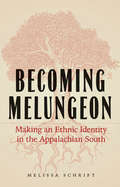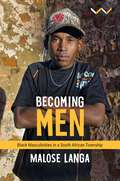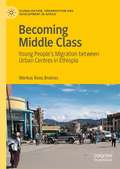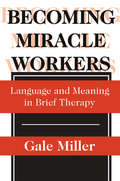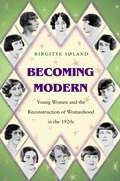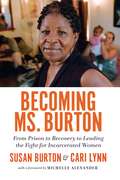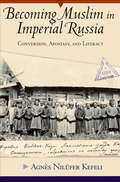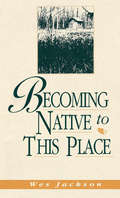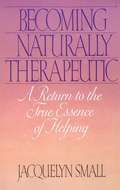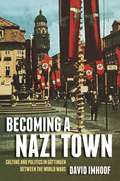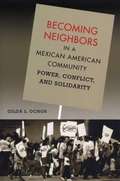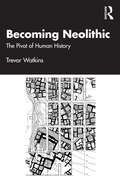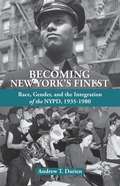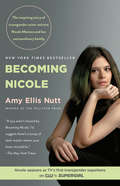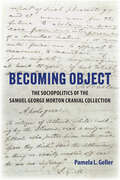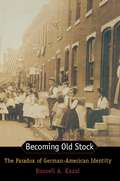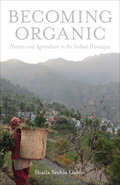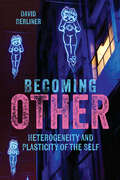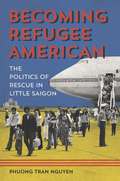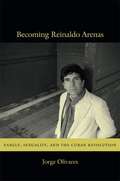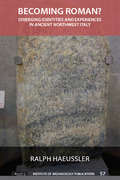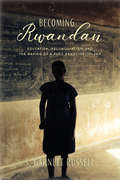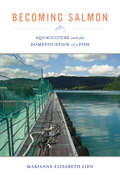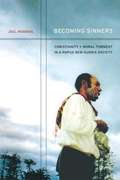- Table View
- List View
Becoming Melungeon: Making an Ethnic Identity in the Appalachian South
by Melissa SchriftAppalachian legend describes a mysterious, multiethnic population of exotic, dark-skinned rogues called Melungeons who rejected the outside world and lived in the remote, rugged mountains in the farthest corner of northeast Tennessee. The allegedly unknown origins of these Melungeons are part of what drove this legend and generated myriad exotic origin theories. Though nobody self-identified as Melungeon before the 1960s, by the 1990s “Melungeonness” had become a full-fledged cultural phenomenon, resulting in a zealous online community and annual meetings where self-identified Melungeons gathered to discuss shared genealogy and history. Although today Melungeons are commonly identified as the descendants of underclass whites, freed African Americans, and Native Americans, this ethnic identity is still largely a social construction based on local tradition, myth, and media. In Becoming Melungeon, Melissa Schrift examines the ways in which the Melungeon ethnic identity has been socially constructed over time by various regional and national media, plays, and other forms of popular culture. Schrift explores how the social construction of this legend evolved into a fervent movement of a self-identified ethnicity in the 1990s. This illuminating and insightful work examines the shifting social constructions of race, ethnicity, and identity both in the local context of the Melungeons and more broadly in an attempt to understand the formation of ethnic groups and identity in the modern world.
Becoming Men: Black masculinities in a South African township
by Dr. Malose LangaThis vivid evocation of the lives of 32 boys from a Johannesburg township is essential reading for anybody wishing to understand black masculinity in South AfricaBecoming Men is the story of 32 boys from Alexandra, one of Johannesburg's largest townships, over a period of twelve seminal years in which they negotiate manhood and masculinity. Psychologist and academic Malose Langa has documented graphically what it means to be a young black man in contemporary South Africa. The boys discuss a range of topics including the impact of absent fathers, relationships with mothers, siblings and girls, school violence, academic performance, homophobia, gangsterism, unemployment and, in one case, prison life. Dominant themes that emerge are deep ambivalence, self-doubt and hesitation in the boys' approaches to alternative masculinities that are non-violent, non-sexist and non-risk-taking. The difficulties of negotiating the multiple voices of masculinity are exposed as many of the boys appear simultaneously to comply with and oppose the prevalent norms. Providing a rich interpretation of how emotional processes affect black adolescent boys, Langa suggests interventions and services to support and assist them, especially in reducing the high-risk behaviours generally associated with hegemonic masculinity. This is essential reading for students, researchers and scholars of gender studies who wish to understand manhood and masculinity in South Africa. Psychologists, youth workers, lay counsellors and teachers who work with adolescent boys will also find it invaluable.
Becoming Middle Class: Young People’s Migration between Urban Centres in Ethiopia (Globalization, Urbanization and Development in Africa)
by Markus Roos BreinesThis book is an ethnography of urban-to-urban migration and its role in middle-class formation in Ethiopia. Through an examination of the intersections and tensions between physical movement and social mobility, it considers how young Tigrayan people’s migration between urban centres made them distinct from both international migrants and non-migrants. Based on fieldwork in Adigrat and Addis Ababa, it focuses on these young people’s notions of progress, experiences of higher education and ethnic tensions to demonstrate how their movements enabled them to enhance their economic, social and symbolic capital while their cultural capital remained largely unchanged. The book provides new insights into the opportunities and constraints for upward social mobility and argues that the emergence of shared characteristics among urban-to-urban migrants led to the formation of a group that can be described as a middle class in Ethiopia.
Becoming Miracle Workers: Language and Learning in Brief Therapy (Social Problems And Social Issues Ser.)
by Gale MillerBrief therapy is a postmodern treatment mode that treats problems as social constructions, encouraging those seeking treatment to replace personal troubles (negative stories) with new problem-solving skills (positive stories). The significant differences discussed in this book do not involve sociologists and brief therapists. The differences are between brief therapists, on the one hand, and practitioners of psychotherapy and family therapy on the other. One indicator of these is brief therapists' describing the people who seek their services as clients. The terminology may be contrasted with the language of patients used by many other therapists. At the very least, this difference suggests how brief therapy departs from therapy approaches that are based on the medical model.Becoming Miracle Workers takes the reader inside "Northland Clinic," one of the most innovative and important centers of brief therapy in the world. Based on twelve years of research, Miller's book discusses how brief therapy has evolved into its present, postmodern form. He describes the details of brief therapist-client interactions, and the behind-the-scenes discussions among brief therapists about their clients' problems. This readable account of the workings of brief therapy invites readers to sit in on brief therapy sessions, provides them with new understandings of personal troubles as social constructions, and shows how brief therapists help their clients develop new, untroubled, life stories.
Becoming Modern: Young Women and the Reconstruction of Womanhood in the 1920s
by Birgitte SølandIn the decade following World War I, nineteenth-century womanhood came under attack not only from feminists but also from innumerable "ordinary" young women determined to create "modern" lives for themselves. These young women cut their hair, wore short skirts, worked for wages, sought entertainment outside the home, and developed new attitudes toward domesticity, sexuality, and their bodies. Historians have generally located the origins of this shift in women's lives in the upheavals of World War I. Birgitte Søland's exquisite social and cultural history suggests, however, that they are to be found not in the war itself, but in much broader social and economic changes.Søland's engrossing chronicle draws on a rich variety of sources--including popular media and medical works as well as archival records and oral histories--to examine how notions of femininity and womanhood were reshaped in Denmark, a small, largely agrarian country that remained neutral during the war. It explores changes in the female body and personality, the forays of young women into the public sphere, the redefinition of female respectability, and new understandings of married life as evidenced in both cultural discourses and social practices. Though specific in its focus, the book raises broad comparative questions as it challenges common assumptions about the social and sexual upheavals that characterized the Western world in the postwar decade. In a remarkably engaging fashion, it shows why the end of World War I did not lead to the return of "normal" life in the 1920s.
Becoming Ms. Burton: From Prison to Recovery to Leading the Fight for Incarcerated Women
by Cari Lynn Susan BurtonBecoming Ms. Burton not only humanizes the deleterious impact of mass incarceration, it also points the way to the kind of structural and policy changes that will offer formerly incarcerated people the possibility of a life of meaning and dignity.
Becoming Muslim in Imperial Russia: Conversion, Apostasy, and Literacy
by Agnes Nilufer KefeliIn the nineteenth century, the Russian Empire's Middle Volga region (today's Tatarstan) was the site of a prolonged struggle between Russian Orthodoxy and Islam, each of which sought to solidify its influence among the frontier’s mix of Turkic, Finno-Ugric, and Slavic peoples. The immediate catalyst of the events that Agnes Nilufer Kefeli chronicles in Becoming Muslim in Imperial Russia was the collective turn to Islam by many of the region’s Krashens, the Muslim and animist Tatars who converted to Russian Orthodoxy between the sixteenth and eighteenth centuries. The traditional view holds that the apostates had really been Muslim all along or that their conversions had been forced by the state or undertaken voluntarily as a matter of convenience. In Kefeli’s view, this argument vastly oversimplifies the complexity of a region where many participated in the religious cultures of both Islam and Orthodox Christianity and where a vibrant Krashen community has survived to the present. By analyzing Russian, Eurasian, and Central Asian ethnographic, administrative, literary, and missionary sources, Kefeli shows how traditional education, with Sufi mystical components, helped to Islamize Finno-Ugric and Turkic peoples in the Kama-Volga countryside and set the stage for the development of modernist Islam in Russia. Of particular interest is Kefeli’s emphasis on the role that Tatar women (both Krashen and Muslim) played as holders and transmitters of Sufi knowledge. Today, she notes, intellectuals and mullahs in Tatarstan seek to revive both Sufi and modernist traditions to counteract new expressions of Islam and promote a purely Tatar Islam aware of its specificity in a post-Christian and secular environment.
Becoming Native to This Place (Blazer Lectures)
by Wes JacksonIn this essay collection, one of the foremost voices in sustainable agriculture sets out a new approach to farming and community engagement.In these six compelling essays, Wes Jackson lays the foundation for a new farming economy grounded in nature's principles and located in dying small towns and rural communities. Exploding the tenets of industrial agriculture, Jackson seeks to integrate food production with nature in a way that sustains both.Jackson’s radical vision is directly at odds with a modern consumer culture that deprives us of any meaningful connection to our natural and social environments. His essays, anchored in his work with The Land Institute, offer an authentic and practical approach to topics that often fail to escape the realm of theory.
Becoming Naturally Therapeutic: A Return to the True Essence of Helping (Revised Edition)
by Jacquelyn SmallAs a classic in the alcohol treatment and counseling communities, here is a life-changing guide for anyone in a therapeutic relationship--whether a professional counselor, a teacher, a parent, or a friend. In this book, Jacquelyn Small shows how to emphasize without enabling, how to care without controlling, and how by helping others in a genuine spirit of giving you invariably help yourself.
Becoming A Nazi Town: Culture And Politics In Göttingen Between The World Wars
by David ImhoofBecoming a Nazi Town reveals the ways in which ordinary Germans changed their cultural lives and their politics from the mid-1920s to the mid-1930s. Casting the origins of Nazism in a new light, David Imhoof charts the process by which Weimar and Nazi culture flowed into each other. He analyzes this dramatic transition by looking closely at three examples of everyday cultural life in the mid-sized German city of Göttingen: sharpshooting, an opera festival, and cinema. Imhoof draws on individual and community experiences over a series of interwar periods to highlight and connect shifts in culture, politics, and everyday life. He demonstrates how Nazi leaders crafted cultural policies based in part on homegrown cultural practices of the 1920s and argues that overdrawn distinctions between “Weimar” and “Nazi” culture did not always conform to most Germans’ daily lives. Further, Imhoof presents experiences in Göttingen as a reflection of the common reality of many German towns beyond the capital city of Berlin.
Becoming Neighbors in a Mexican American Community: Power Conflict and Solidarity
by Ochoa Gilda L.Focusing on the Mexican-origin, working-class city of La Puente in Los Angeles County, California, this book examines Mexican Americans' everyday attitudes toward and interactions with Mexican immigrants—a topic that has so far received little serious study. Using in-depth interviews, participant observations, school board meeting minutes, and other historical documents, Gilda Ochoa investigates how Mexican Americans are negotiating their relationships with immigrants at an interpersonal level in the places where they shop, worship, learn, and raise their families. This research into daily lives highlights the centrality of women in the process of negotiating and building communities and sheds new light on identity formation and group mobilization in the U.S. and on educational issues, especially bilingual education. It also complements previous studies on the impact of immigration on the wages and employment opportunities of Mexican Americans.
Becoming Neolithic: The Pivot of Human History
by Trevor WatkinsBecoming Neolithic examines the revolutionary transformation of human life that was taking place around 12,000 years ago in parts of southwest Asia. Hunter-gatherer communities were building the first permanent settlements, creating public monuments and symbolic imagery, and beginning to cultivate crops and manage animals. These communities changed the tempo of cultural, social, technological and economic innovation. Trevor Watkins sets the story of becoming Neolithic in the context of contemporary cultural evolutionary theory. There have been 70 years of international inter-disciplinary research in the field and in the laboratory. Stage by stage, he unfolds an up-to-date understanding of the archaeology, the environmental and climatic evidence and the research on the slow domestication of plants and animals. Turning to the latest theoretical work on cultural evolution and cultural niche construction, he shows why the transformation accomplished in the Neolithic began to accelerate the scale and tempo of human history. Everything that followed the Neolithic, up to our own times, has happened in a different way from the tens of thousands of years of human evolution that preceded it. This well-documented account offers a useful synthesis for students of prehistoric archaeology and anyone with an interest in our prehistoric roots. This new narrative of the first rapid transformation in human evolution is also informative to those interested in cultural evolutionary theory.
Becoming New Yorkers: Ethnographies of the New Second Generation
by Philip Kasinitz John H. Mollenkopf Mary C. WatersThis book brings together in-depth ethnographies of some of New York's largest immigrant populations to assess the experience of the new second generation and to explore the ways in which they are changing the fabric of American culture.
Becoming New York’s Finest
by Andrew T. DarienAfter excluding women and African Americans from its ranks for most of its history, the New York City Police Department undertook an aggressive campaign of integration following World War II. This is the first comprehensive account of how and why the NYPD came to see integration as a highly coveted political tool, indispensable to policing.
Becoming Nicole: The Transformation of an American Family
by Amy Ellis NuttThe inspiring true story of a transgender girl, her identical twin brother, and an ordinary American family's extraordinary journey to understand, nurture, and celebrate the uniqueness in us all, from the Pulitzer Prize-winning science reporter for The Washington Post When Wayne and Kelly Maines adopted identical twin boys, they thought their lives were complete. But it wasn't long before they noticed a marked difference between Jonas and his brother, Wyatt. Jonas preferred sports and trucks and many of the things little boys were "supposed" to like; but Wyatt liked princess dolls and dress-up and playing Little Mermaid. By the time the twins were toddlers, confusion over Wyatt's insistence that he was female began to tear the family apart. In the years that followed, the Maineses came to question their long-held views on gender and identity, to accept and embrace Wyatt's transition to Nicole, and to undergo an emotionally wrenching transformation of their own that would change all their lives forever. Becoming Nicole chronicles a journey that could have destroyed a family but instead brought it closer together. It's the story of a mother whose instincts told her that her child needed love and acceptance, not ostracism and disapproval; of a Republican, Air Force veteran father who overcame his deepest fears to become a vocal advocate for trans rights; of a loving brother who bravely stuck up for his twin sister; and of a town forced to confront its prejudices, a school compelled to rewrite its rules, and a courageous community of transgender activists determined to make their voices heard. Ultimately, Becoming Nicole is the story of an extraordinary girl who fought for the right to be herself. Granted wide-ranging access to personal diaries, home videos, clinical journals, legal documents, medical records, and the Maineses themselves, Amy Ellis Nutt spent almost four years reporting this immersive account of an American family confronting an issue that is at the center of today's cultural debate. Becoming Nicole will resonate with anyone who's ever raised a child, felt at odds with society's conventions and norms, or had to embrace life when it plays out unexpectedly. It's a story of standing up for your beliefs and yourself--and it will inspire all of us to do the same.Advance praise for Becoming Nicole "Becoming Nicole is a miracle. It's the story of a family struggling with--and embracing--a transgender child. But more than that, it's about accepting one another, and ourselves, in all our messy, contradictory glory. The Maines family is as American as they come. In the journey they take toward authenticity and justice, we see a model for the future of our country, a future in which all of us--mothers and fathers, brothers and sisters--somehow find the courage, and the love, to become our best selves."--Jennifer Finney Boylan, co-chair of GLAAD and author of She's Not There: A Life in Two Genders"Gripping . . . a timely, significant examination."--Kirkus ReviewsFrom the Hardcover edition.
Becoming Object: The Sociopolitics of the Samuel George Morton Cranial Collection
by Pamela L. GellerA biohistoric investigation of a controversial museum collection This book considers the vast collection of skulls amassed by Samuel Morton in the first half of the nineteenth century. Craniometric studies undertaken by this Philadelphia physician and natural historian, as previous writers have noted, advanced scientific racism. In Becoming Object, Pamela Geller shows that while the characterization is accurate, it is also oversimplified. Geller uses a biohistoric approach, which examines skeletal remains and archival sources, to take a close look at the times in which Morton lived, his work, and its complicated legacy.During a pivotal moment in US history—an interlude between the nation’s cohesion and its civil unraveling—Morton and colleagues encouraged and developed biomedical interventions, public health initiatives, and scientific standards. Yet they also represented certain populations as biologically inferior; diseases were tied to non-white races, suffering was gendered female, and poverty was presumed inherited. Efforts by Morton and colleagues made it easier to rationalize the deaths of disenfranchised individuals, collect their skulls from almshouse hospitals and battlefields, and transform them into objects. Ultimately, these men’s studies of diseases and skulls contributed to an understanding of American citizenship that valued whiteness, Christianity, and heroic masculinity defined by violence. Though medicine came to repudiate Morton’s work, his thinking became foundational for anthropology. The Morton Collection, a tangible reminder of his legacy, has become a barometer of the discipline’s relationship to white supremacy and colonialism. To advance today’s decolonial efforts, Becoming Object turns to the Morton Collection to document the diverse lives excluded from the body politic. To recount their stories, as Geller does, is to counter official histories, while the silences that remain hint at the subtle machinations of necropolitics.
Becoming Old Stock: The Paradox of German-American Identity
by Russell A. KazalMore Americans trace their ancestry to Germany than to any other country. Arguably, German Americans form America's largest ethnic group. Yet they have a remarkably low profile today, reflecting a dramatic, twentieth-century retreat from German-American identity. In this age of multiculturalism, why have German Americans gone into ethnic eclipse--and where have they ended up? Becoming Old Stock represents the first in-depth exploration of that question. The book describes how German Philadelphians reinvented themselves in the early twentieth century, especially after World War I brought a nationwide anti-German backlash. Using quantitative methods, oral history, and a cultural analysis of written sources, the book explores how, by the 1920s, many middle-class and Lutheran residents had redefined themselves in "old-stock" terms--as "American" in opposition to southeastern European "new immigrants." It also examines working-class and Catholic Germans, who came to share a common identity with other European immigrants, but not with newly arrived black Southerners. Becoming Old Stock sheds light on the way German Americans used race, American nationalism, and mass culture to fashion new identities in place of ethnic ones. It is also an important contribution to the growing literature on racial identity among European Americans. In tracing the fate of one of America's largest ethnic groups, Becoming Old Stock challenges historians to rethink the phenomenon of ethnic assimilation and to explore its complex relationship to American pluralism.
Becoming Organic: Nature and Agriculture in the Indian Himalaya (Yale Agrarian Studies Series)
by Shaila Seshia GalvinA rich, original study of the social and bureaucratic life of organic quality that challenges assumptions of what organic means Shaila Seshia Galvin examines certified organic agriculture in India&’s central Himalayas, revealing how the fraught concept of organic is less a material property of land or its produce than a quality produced in discursive, regulatory, and affective registers. Becoming Organic is a nuanced account of development practice in rural India, as it has unfolded through complex relationships forged among state authorities, private corporations, and new agrarian intermediaries.
Becoming Other: Heterogeneity and Plasticity of the Self
by David BerlinerMost of us are conscious of having a single and stable self, but the self is more fragmented and plastic than we care to think. David Berliner explores the captivating world of identity through an array of astonishing experiences. From Napoleon doppelgangers to Philip Roth's alter-ego Nathan Zukerman and Wonder Woman cosplayers to anthropologists going native, he delves into the kaleidoscopic nature of the self and attempts to understand the heterogenous nature of identity. But Becoming Other also discusses a great cultural controversy of our time: who has the right to play at being whom?
Becoming Refugee American: The Politics of Rescue in Little Saigon
by Phuong Tran NguyenVietnamese refugees fleeing the fall of South Vietnam faced a paradox. The same guilt-ridden America that only reluctantly accepted them expected, and rewarded, expressions of gratitude for their rescue. Meanwhile, their status as refugees ”as opposed to willing immigrants ”profoundly influenced their cultural identity. Phuong Tran Nguyen examines the phenomenon of refugee nationalism among Vietnamese Americans in Southern California. Here, the residents of Little Saigon keep alive nostalgia for the old regime and, by extension, their claim to a lost statehood. Their refugee nationalism is less a refusal to assimilate than a mode of becoming, in essence, a distinct group of refugee Americans. Nguyen examines the factors that encouraged them to adopt this identity. His analysis also moves beyond the familiar rescue narrative to chart the intimate yet contentious relationship these Vietnamese Americans have with their adopted homeland. Nguyen sets their plight within the context of the Cold War, an era when Americans sought to atone for broken promises but also saw themselves as providing a sanctuary for people everywhere fleeing communism.
Becoming Reinaldo Arenas: Family, Sexuality, and the Cuban Revolution
by Jorge OlivaresBecoming Reinaldo Arenas explores the life and work of the Cuban writer Reinaldo Arenas (1943-1990), who emerged on the Latin American cultural scene in the 1960s and quickly achieved literary fame. Yet as a political dissident and an openly gay man, Arenas also experienced discrimination and persecution; he produced much of his work amid political controversy and precarious living conditions. In 1980, having survived ostracism and incarceration in Cuba, he arrived in the United States during the Mariel boatlift. Ten years later, after struggling with poverty and AIDS in New York, Arenas committed suicide. Through insightful close readings of a selection of Arenas's works, including unpublished manuscripts and correspondence, Olivares examines the writer's personal, political, and artistic trajectory, focusing on his portrayals of family, sexuality, exile, and nostalgia. He documents Arenas's critical engagement with cultural and political developments in revolutionary Cuba and investigates the ways in which Arenas challenged literary and national norms. Olivares's analysis shows how Arenas drew on his life experiences to offer revealing perspectives on the Cuban Revolution, the struggles of Cuban exiles, and the politics of sexuality.
Becoming Roman?: Diverging Identities and Experiences in Ancient Northwest Italy (UCL Institute of Archaeology Publications #57)
by Ralph HaeusslerFew empires had such an impact on the conquered peoples as did the Roman empire, creating social, economic, and cultural changes that erased long-standing differences in material culture, languages, cults, rituals and identities. But even Rome could not create a single unified culture. Individual decisions introduced changes in material culture, identity, and behavior, creating local cultures within the global world of the Roman empire that were neither Roman nor native. The author uses Northwest Italy as an exemplary case as it went from a marginal zone to one of the most flourishing and strongly urbanized regions of Italy, while developing a unique regional culture. This volume will appeal to researchers interested in the Roman Empire, as well as those interested in individual and cultural identity in the past.
Becoming Rwandan: Education, Reconciliation, and the Making of a Post-Genocide Citizen (Genocide, Political Violence, Human Righ)
by S. Garnett RussellIn the aftermath of the genocide, the Rwandan government has attempted to use the education system in order to sustain peace and shape a new generation of Rwandans. Their hope is to create a generation focused on a unified and patriotic future rather than the ethnically divisive past. Yet, the government’s efforts to manipulate global models around citizenship, human rights, and reconciliation to serve its national goals have had mixed results, with new tensions emerging across social groups. Becoming Rwandan argues that although the Rwandan government utilizes global discourses in national policy documents, the way in which teachers and students engage with these global models distorts the intention of the government, resulting in unintended consequences and undermining a sustainable peace.
Becoming Salmon
by Marianne Elisabeth LienBecoming Salmon is the first ethnographic account of salmon aquaculture, the most recent turn in the human history of animal domestication. In this careful and nuanced study, Marianne Elisabeth Lien explores how the growth of marine domestication has blurred traditional distinctions between fish and animals, recasting farmed fish as sentient beings, capable of feeling pain and subject to animal-welfare legislation. Drawing on fieldwork on and off salmon farms, Lien follows farmed Atlantic salmon through contemporary industrial husbandry, exposing how salmon are bred to be hungry, globally mobile, and "alien" in their watersheds of origin. Attentive to both the economic context of industrial food production and the materiality of human-animal relations, this book highlights the fragile and contingent relational practices that constitute salmon aquaculture and the multiple ways of "becoming salmon" that emerge as a result.
Becoming Sinners: Christianity and Moral Torment in a Papua New Guinea Society
by Joel RobbinsA study of cultural change through the study of the Christianization of the Urapmin, a Melanesian society in Papua New Guinea.
